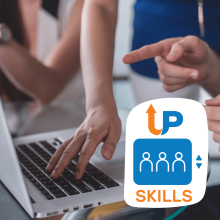
Trainers and educators who wish to develop learning content based on best practices in the CLARIN community and wider SSH network are invited to browse the resources on this page.
Integrating Research and Research Infrastructures into Teaching
Research-Based Teaching: Guidelines and Best Practices
These guidelines contain a template for designing research-based (RBT) courses and defining learning outcomes, examples and testimonials, and other valuable resources for teachers (e.g. a research report template, a survey course evaluation by students). CLARIN contributed to formulating the learning outcomes related to using research infrastructures and data collection and archiving techniques. The guidelines can also be browsed on the UPSKILLS project website.
Integrating Research Infrastructures into Teaching: Recommendations and Best Practices

This guide shows teachers and trainers how to leverage the CLARIN research infrastructure to help students enhance their data collection, processing and analysis, and archiving skills. By integrating research infrastructures into teaching, educators can bridge the gap between theoretical knowledge and practical aspects of linguistic research data management, equipping students with the necessary skills and competences to thrive in the evolving landscape of Open Science and data-driven research. The guidelines can also be browsed on the UPSKILLS project website.
Also see the recordings, slides and blog from this CLARIN Café: Towards Guidelines for Integrating CLARIN into Teaching - Lessons Learnt from UPSKILLS.
Guidelines for Students' Projects and Research Reporting Formats
This document, co-authored by CLARIN, includes instructions for teachers to define project learning outcomes, assessment, and evaluation strategies. It also contains practical guidance for issues such as managing research data during the project and depositing research outputs in a public research data repository. Teachers are also provided templates for various reporting formats that can be adapted and shared with students.
For a more detailed account, see CLARIN's contribution to the UPSKILLS project.
FAIRification of Training Materials and Data Stewardship Networks
Training trainers and data stewards is an important aspect of CLARIN’s wider strategy. CLARIN is involved in relevant initiatives at the level of the European Open Science Cloud ( ) and Research Data Alliance ( ), as well as other networks involved in the FAIRification of training materials and the setting up of data stewardship networks. See a full overview of CLARIN’s Collaboration on Training.
In collaboration with the ELIXIR infrastructure community of trainers, CLARIN has contributed to a FAIR Training Handbook on Github, which shows developers of training materials how to make them FAIR by designing them with reuse in mind, using consistent metadata to describe them, assigning persistent identifiers and open licences, and making them accessible and findable through public registries and repositories.
To learn how to apply the FAIR-by-Design Principles in training materials development, please check the FAIR-by-Design Training for CLARIN Community developed in collaboration with the Skills4EOSC project. The toolkit can be downloaded from Zenodo and adapted further to cover the training needs in your community.
Training Platforms: What is What?
To understand the difference between the various different training platforms, such as the CLARIN Learning Hub, UPSKILLS, DARIAH-CAMPUS, DARIAH-Teach, SSH Open Marketplace, and the DH Course Registry, see this flyer created for the CLARIN 2023 Annual Conference.
Vocabularies

The SSHOC Multilingual Data Stewardship Terminology is an example of a multilingual terminology compiled according to best practices in the field that can be shared with students. The terminology consists of 211 concepts available in Dutch, French, German, Greek, Italian and Slovenian, and is a useful resource to integrate into the Open Science curricula, or courses dealing with Terminology, Translation, Corpus Linguistics, , Knowledge Engineering, or Digital Humanities. The methodology for compiling the SSHOC Terminology described in this Report on Ontology and Vocabulary Collection and Publication.